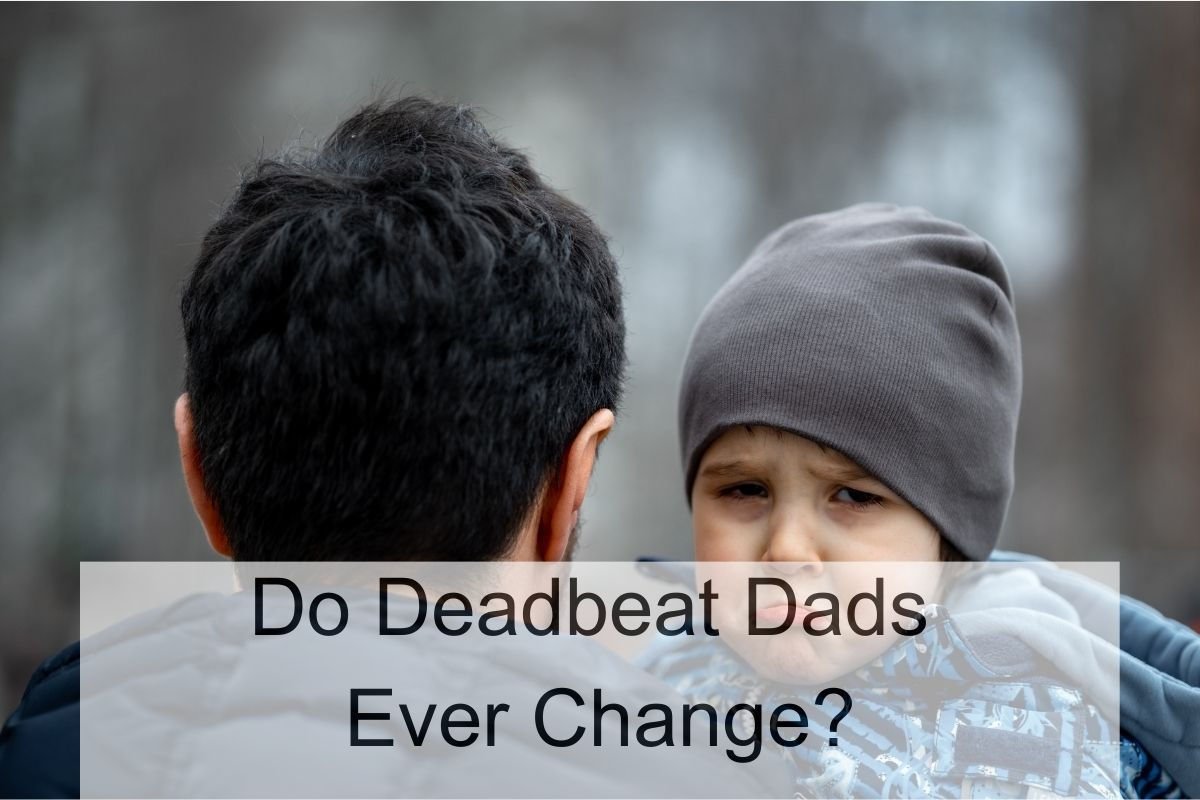As someone who has experienced the absence of a father, I know firsthand the impact it can have on a child’s life. Deadbeat dads, or fathers who fail to fulfill their financial and emotional responsibilities towards their children, are unfortunately all too common. Many children grow up without the support and guidance of their fathers, leading to a range of negative consequences. But do deadbeat dads ever change? Can they become responsible and involved fathers later in life?

It’s a question that many children of deadbeat dads ask themselves. While it’s true that some deadbeat dads do eventually step up and take responsibility for their children, it’s important to remember that not all deadbeat dads are the same. Some may truly want to change but are struggling with personal or financial issues that make it difficult for them to do so, while others may have no intention of changing their ways. In any case, it’s important for children of deadbeat dads to prioritize their own well-being and seek out support from other sources, such as family members, friends, or counselors.
Understanding Deadbeat Dads

As a therapist, I have worked with many families who have been affected by deadbeat dads. The term “deadbeat dad” is often used to describe fathers who do not fulfill their financial obligations to their children. However, the reality is much more complex than this stereotype.
Definition and Stereotypes
A deadbeat dad is typically defined as a father who does not pay child support. However, this definition is too narrow and fails to take into account the many other ways in which fathers can support their children. For example, a father can provide emotional support, spend time with their children, and help with childcare. Unfortunately, the stereotype of the deadbeat dad often leads to the assumption that all fathers who do not pay child support are bad fathers.
Psychological Factors Influencing Behavior
There are many reasons why a father may become a deadbeat dad. For some, it may be a result of financial hardship or unemployment. For others, it may be a result of a strained relationship with the mother of their children. However, there are also psychological factors that can influence a father’s behavior.
For example, some fathers may feel overwhelmed by the responsibilities of fatherhood and may struggle to cope with the demands of parenting. Others may have unresolved emotional issues or may struggle with addiction or mental health problems. These factors can make it difficult for a father to fulfill his obligations to his children.
Patterns of Change

As someone who has worked with many fathers who have struggled with providing financial support for their children, I have seen patterns of change that can occur. While every person is different and there is no guarantee that someone will change, I have seen some common triggers for transformation and stages of personal development that can lead to positive change.
Triggers for Transformation
For some fathers, a major life event can be the catalyst for change. This could be anything from a health scare to a new relationship to a job loss. These events can cause a person to reevaluate their priorities and make changes in their life. For example, a father who has been absent from his child’s life may realize the importance of being a positive role model and decide to make changes to be more present.
Another trigger for transformation can be education or counseling. Many fathers who struggle with providing financial support for their children may not understand the impact their actions have on their children. By learning about child development and the importance of a father’s role in a child’s life, some fathers may be motivated to make changes.
Stages of Personal Development
For those fathers who do decide to make changes, there are often stages of personal development that they go through. These stages can include denial, anger, bargaining, depression, and acceptance. It’s important to note that not everyone goes through all of these stages and they may not occur in a specific order.
During the denial stage, a father may not see the impact his actions are having on his child or may not believe that he needs to change. Anger can be directed at the mother of the child, the court system, or even the child themselves. Bargaining may involve making promises to change, but not following through. Depression can occur when a father realizes the impact his actions have had on his child and feels overwhelmed. Acceptance is when a father takes responsibility for his actions and makes a commitment to change.
Impact of Fatherhood Involvement

As a father, I understand the importance of being involved in my children’s lives. Fatherhood involvement has been shown to have a positive impact on both children and fathers. In this section, I will discuss the effects of fatherhood involvement on children and the benefits for fathers.
Effects on Children
Studies have shown that children who have involved fathers are more likely to have better academic performance, higher self-esteem, and better social skills. They are also less likely to engage in risky behaviors such as drug use and early sexual activity. Fatherhood involvement has also been linked to reduced rates of depression and anxiety in children.
Furthermore, children who have involved fathers are more likely to have a positive relationship with their fathers as adults. This relationship can have a lasting impact on the child’s mental health and well-being.
Benefits for Fathers
Fatherhood involvement also has benefits for fathers. Involved fathers have reported higher levels of life satisfaction and happiness. They are also more likely to have a positive relationship with their partners and to be involved in their communities.
Being an involved father can also lead to better physical health. Studies have shown that fathers who are involved in their children’s lives have lower rates of heart disease and other chronic illnesses.
Strategies for Change

Self-Reflection and Responsibility
The first step in changing deadbeat dad behavior is self-reflection. I need to take a hard look at my actions and decisions and accept responsibility for my past mistakes. This means acknowledging the harm I may have caused my children and their mother, and being willing to make amends. It also means being honest with myself about my financial situation and my ability to provide for my children.
Seeking Professional Help
Changing deadbeat dad behavior is not easy, and I may need help along the way. Seeking professional help can be a powerful tool in overcoming obstacles and developing new strategies for success. This may include therapy or counseling to address underlying emotional issues or financial planning to help me get back on track.
Legal and Social Incentives
Finally, legal and social incentives can be powerful motivators for change. This may include court-ordered child support payments or access to social services that can help me find employment or housing. It may also include support from family and friends who can offer encouragement and guidance along the way.
Challenges to Change
As a therapist who has worked with many families, I have seen firsthand the challenges that deadbeat dads face when trying to turn their lives around. Here are some of the most common hurdles that these fathers encounter:
Financial Hurdles
One of the biggest obstacles to change is financial instability. Many non-custodial fathers struggle to find steady employment and may have a significant amount of debt. This can make it difficult to pay child support and meet other financial obligations. Without a stable source of income, it can be nearly impossible to make meaningful progress toward becoming a more responsible parent.
Rebuilding Trust
Another significant challenge is rebuilding trust with their children and the custodial parent. Deadbeat dads may have a history of broken promises and missed opportunities, which can make it difficult for their children to trust them again. It takes time and effort to rebuild these relationships, and it requires a lot of patience and understanding from all parties involved.
Coping with Societal Judgments
Deadbeat dads also face societal judgments and stereotypes that can make it difficult to move forward. They may feel stigmatized and ashamed, which can lead to feelings of hopelessness and despair. It’s important for them to have a support system in place that can help them cope with these negative perceptions and provide encouragement and guidance as they work to make positive changes in their lives.
Success Stories
Real-Life Examples
I have personally witnessed a few instances where deadbeat dads have turned their lives around and become responsible fathers. One example is my friend Mike, who was struggling with addiction and had lost custody of his children. After going through rehab and getting his life back on track, he fought for custody and was able to regain full custody of his kids. He now has a stable job and is an active participant in his children’s lives, attending school events and extracurricular activities.
Another example is John, who had a history of not paying child support and was not involved in his children’s lives. After attending a support group for fathers, he realized the importance of being present for his children. He started paying child support regularly and made an effort to spend time with his kids. Over time, he was able to repair his relationship with his children and now has a close bond with them.
Support Systems Role
It is important to note that these success stories were not achieved alone. Both Mike and John had support systems that helped them along the way. Mike had his family and friends who provided emotional and financial support during his recovery. John had the support of a fatherhood program that provided him with resources and guidance on how to be a better father.
Preventative Measures
As someone who has experienced the challenges of dealing with a deadbeat dad, I understand the importance of taking preventative measures. Here are some strategies that can help prevent a dad from becoming a deadbeat dad:
Education and Awareness
One of the most effective ways to prevent deadbeat dads is through education and awareness. By educating fathers on their responsibilities and the impact of their actions, we can help prevent them from abandoning their children. It’s important to provide resources and support to fathers who are struggling to meet their obligations. This can include counseling, financial planning, and parenting classes.
Community Support Initiatives
Community support initiatives can also play a key role in preventing deadbeat dads. By creating a network of support for fathers, we can help them stay connected to their children and meet their obligations. This can include mentorship programs, support groups, and outreach efforts to fathers who are at risk of becoming deadbeat dads. By building a strong community of support, we can help fathers stay engaged and involved in their children’s lives.

